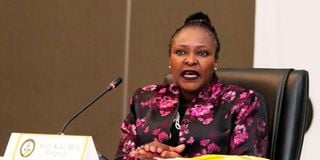Premium
Will ambassador Koki Muli be third time lucky in bid for IEBC job?

Ambassador Koki Muli during her interview at the KICC in Nairobi on July 16, 2021, for the position of commissioner of the Independent Electoral and Boundaries Commission.
What you need to know:
- Ms Muli, who faced the IEBC interviewing panel on Friday, lost the race to become Kenya’s first elections boss under the 2010 Constitution in October 2011, when Ahmed Issack Hassan took the helm.
Will Kenya’s renowned elections expert, Ms Koki Muli, be third time lucky in her bid to join the Independent Electoral and Boundaries Commission (IEBC)?
Ms Muli, who faced the IEBC interviewing panel on Friday, lost the race to become Kenya’s first elections boss under the 2010 Constitution in October 2011, when Ahmed Issack Hassan took the helm.
A former ambassador to the United Nations, Ms Muli had been shortlisted alongside Mr Hassan and Mr Murshid Abdalla. Their names were forwarded to former President Mwai Kibaki and former Prime Minister Raila Odinga by the recruitment panel chaired by Dr Ekuru Aukot.
The two principals of the grand coalition government settled on Mr Hassan, with Ms Muli failing to get the top elections job for the second time.
This triggered speculation that she was bypassed because of the regional balance consideration, as she and the then Chief Justice Willy Mutunga were both from Kitui County, with their villages neighbouring each other.
Earlier in 2009, she was among eight lawyers interviewed by the parliamentary select committee on the Constitution for the same job. Cecil Miller Jr was picked only to be rejected by Parliament.
‘Outstanding credentials’
In a past interview with the Nation, Ms Muli declined to delve into what the two losses meant, considering her competencies and global experience.
She said that even though her outstanding credentials were ignored, hers would not be a case of sour grapes and that she would continue offering her expertise to the country.
“This is my beloved country. I have a passion for credible elections and will therefore be available when called upon to help the commission in achieving that goal,” she said.
“I do not have to be that person for Kenya to succeed in that field. What is critical is for whoever is nominated to understand what needs to be done, how it should be done, with whom in terms of stakeholders, and with what resources.”
Ms Muli takes pride in her credentials as the only African woman qualified to train and accredit students in election processes under the Bridge (Building Resources in Democracy, Governance and Elections) curriculum.
Her achievements were acknowledged by the Kriegler Commission, which investigated the post-election violence following the disputed 2007 polls.
Bridge training
In its report, the commission recommended Bridge training - a professional development course in election administration and the only one in use worldwide - for the new electoral commission.
The Bridge curriculum aims to improve the skills, knowledge and confidence of election professionals and key stakeholders in the electoral process, including members of political parties, the media and electoral observers.
Ms Muli said: “I have helped many countries across the world establish electoral systems, including South Africa, Botswana, Lesotho, Mozambique, Zimbabwe, DRC, Uganda, Tanzania, Liberia and Ghana. Why not Kenya?”
She is recognised internationally as an accomplished elections expert and the first woman in Africa with such expertise — the others being three men from Egypt, South Africa and Senegal.
An advocate of the High Court of Kenya, Ms Muli has a master’s degree from the University of London and is set to receive her doctoral degree from Oxford University later this year.





